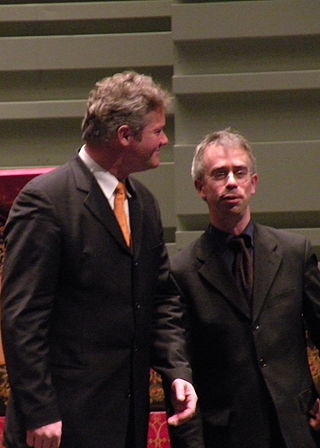Related Research Articles

Marin Marais was a French composer and viol player. He studied composition with Jean-Baptiste Lully, often conducting his operas, and with master of the bass viol Monsieur de Sainte-Colombe for six months. In 1676 he was hired as a musician to the royal court of Versailles and was moderately successful there, being appointed in 1679 as ordinaire de la chambre du roy pour la viole, a title he kept until 1725.

Jordi Savall i Bernadet is a Spanish conductor, composer and viol player. He has been one of the major figures in the field of Western early music since the 1970s, largely responsible for popularizing the viol family of instruments in contemporary performance and recording. As a historian of early music his repertoire features everything from medieval, Renaissance and Baroque through to the Classical and Romantic periods. He has incorporated non-western musical traditions in his work; including African vernacular music for a documentary on slavery.

Hespèrion XXI is an international early music ensemble. The group was formed in Basel, Switzerland in 1974 as Hespèrion XX by Catalan musical director Jordi Savall, his wife Montserrat Figueras (soprano), Lorenzo Alpert, and Hopkinson Smith. The group changed its name to Hespèrion XXI at the beginning of the 21st century. The name "Hespèrion" is derived from a word in Classical Greek which referred to the people of the Italian and Iberian peninsulas.
Joan Cererols was a Spanish composer and Benedictine monk. His musical production includes a Requiem composed in the mid-seventeenth century during the great plague which ravaged Barcelona, and a Missa de Batalla which celebrates the conquest of the Kingdom of Naples.
Carlos Mena is a Spanish countertenor opera singer. He has previously worked with groups such as Al Ayre Español, Ensemble Gilles Binchois, and Ricercar Consort and has an interest in the twentieth-century repertoire.
Giovanni Girolamo Kapsperger was an Austrian-Italian virtuoso performer and composer of the early Baroque period. A prolific and highly original composer, Kapsberger is chiefly remembered today for his lute and theorbo (chitarrone) music, which was seminal in the development of these as solo instruments.

Pierre Hantaï is a French harpsichordist and conductor.

Montserrat Figueras i García was a Spanish soprano who specialized in early music.

Tous les matins du monde (All the mornings of the world) is a 1991 French film based on the book of the same name by Pascal Quignard. Set during the reign of Louis XIV, the film shows the musician Marin Marais looking back on his young life when he was briefly a pupil of Monsieur de Sainte-Colombe, and features much music of the period, especially that for the viola da gamba. The title of the film comes from words of the narrator in Quignard's novel.

Alcyone is an opera by the French composer Marin Marais. It takes the form of a tragédie en musique in a prologue and five acts. The libretto, by Antoine Houdar de la Motte, is based on the Greek myth of Alcyone and Ceyx as recounted by Ovid in his Metamorphoses. The opera was first performed on 18 February 1706 by the Académie royale de musique at the Théâtre du Palais-Royal in Paris. The score is particularly famous for the storm scene (tempête) in act 4. The "Marche pour les Matelots", from act 3, became popular as a dance tune and is the basis of the Christmas carol "Masters in This Hall".
Eduardo Egüez is a lutenist, theorbist, and guitarist acclaimed for his interpretations of music by J.S.Bach.

The Cancionero de Palacio, or Cancionero Musical de Palacio (CMP), also known as Cancionero de Barbieri, is a Spanish manuscript of Renaissance music. The works in it were compiled during a time span of around 40 years, from the mid-1470s until the beginning of the 16th century, approximately coinciding with the reign of the Catholic Monarchs.
Michel Bernstein was a French musical producer and founder of several record labels.

Arianna Savall i Figueras is a Swiss-born Spanish classical singer, harpist and composer. She sings in Catalan, French, English, Spanish, Portuguese and other languages of the world.
José Marín was a Spanish Baroque harpist, guitarist and composer noted for his secular songs, tonos humanos.
Juan de Triana was a Spanish composer of the Renaissance period, active in the second half of the 15th century during the reign of the Catholic Monarchs. Pope Sixtus IV issued a bull on 9 February 1478 that listed De Triana as Prebendary of the Cathedral of Sevilla for at least a year before. He later moved to the Cathedral of Toledo, where it was recorded that in 1483 he was a teacher of six children in the Cathedral, with a salary of 18,000 maravedíes, a significant quantity at the time. Possibly Triana held this position until 1490, when he was replaced by Pedro de Lagarto. He died in Seville on 28 January 1494, and was buried near the gate of the chapel of the Virgen de la Antigua. In his will, he left a bequest to endow a chaplaincy to sing twenty-five masses a month for his soul at the altar of San Juan Bautista, near his place of burial.
Juan de Urrede or Juan de Urreda was a Flemish singer and composer active in Spain in the service of the Duke of Alba and King Ferdinand and Queen Isabella. He was born Johannes de Wreede in Bruges.
Auvidis was a record label founded in 1976 by Louis Bricard. Along with its subsidiaries, it was acquired in 1998 by Naïve Records.
Jérôme Hantaï is a viola da gamba player and fortepianist.

Enrico Onofri is an Italian violinist and conductor specialising in Baroque music.
References
- 1 2 3 "Rolf Lislevand". Store Norske Leksikon (in Norwegian). 2016-02-09. Retrieved 2016-07-21.
- ↑ "Rolf Lislevand". Lastfm.es. Retrieved 2016-07-21.
- ↑ "Rolf Lislevand". Discography. Discogs.com . Retrieved 2016-07-21.